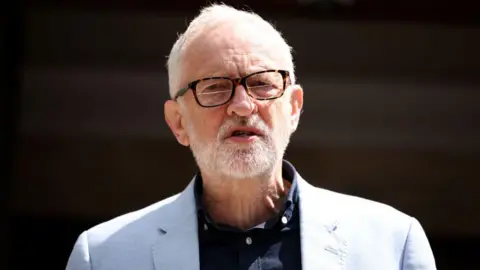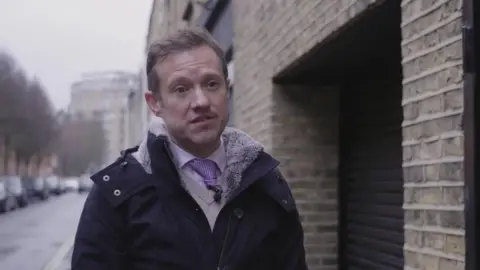Rent caps needed as part of reforms, says Corbyn
 Getty Images
Getty ImagesRent controls should be introduced among other planned reforms to help tackle spiralling costs for London's tenants, Jeremy Corbyn has said.
The government has said it is "transforming rights" with its Renters' Rights Bill, which includes bans on no-fault evictions and bidding wars, limiting rent rises to once a year and allowing tenants to challenge excessive increases.
But the former Labour leader, who now represents Islington North as an independent, told BBC London the reforms would still allow landlords to make "excessive profits" and leave tenants "exploited".
The National Residential Landlords Association (NRLA) said reforms must be fair for both renters and landlords.
Rent has been soaring to record levels in recent years, particularly in London.
One of those who was recently on the sharp end of the capital's rising rents told BBC London the issue can "destabilise your entire life".
Conall Ó Brolcháin said he was forced to leave his last flat in Tottenham, north London, when his landlord hiked the rent from £1,200 a month to over £1,800.
"We have been in London for five years, in Tottenham the whole time and that was clearly very stressful for myself and my partner," he said.
"Trying to find a home is very difficult," he added.

As part of the Renters' Rights Bill, section 21 notices, also known as no-fault evictions, would be changed so that landlords would no longer be able to evict tenants without justification.
They would instead need a legally valid reason, such as rent arrears or wanting to sell the property.
Landlords would also be obliged to address serious issues with their properties within a set deadline under the plans.
However, Corbyn said the plans do not go far enough and that rent controls were necessary.
He explained that currently for someone to comfortably afford a one or two bedroom flat costing about £2,000 per month in his constituency, a person would need to earn £80,000.
"There were rent controls in this country until Margaret Thatcher came along, there are still rent controls in New York, San Francisco and in many countries across Europe," he said.
"It seems to me a reasonable way of preventing excessive profits being made out of the private rented sector and exploiting people who are in desperate housing need."
The government has said it does not support rent controls, arguing it leads to higher rents at the start of a tenancy, can make it harder for prospective tenants to find a home and can lead to unregulated subletting.

Ben Beadle, the chief executive of the NRLA, said landlords were not against reforming the system, but they needed to "have confidence" in the proposals.
"I'm not so sure they do at the moment," he said.
"We have no issue with section 21 being replaced as long as the alternative is viable and workable."
Mr Beadle added court backlogs meant it takes landlords an average of seven months to get back possession of a property when there is legitimate reasons to do so, such as anti-social behaviour, which needed to be addressed.
A Ministry of Housing, Communities and Local Government spokesperson said: "Our Renters' Rights Bill will give tenants stronger powers to challenge excessive rent hikes.
"We are also taking action to cap advance payments to one month's rent, end unfair bidding wars and ban no fault evictions, so tenants can reap the rewards of greater security and stability in their homes."
Watch the full report on Politics London at 10:00 GMT on BBC One, or on BBC iPlayer.
Listen to the best of BBC Radio London on Sounds and follow BBC London on Facebook, X and Instagram. Send your story ideas to [email protected]
